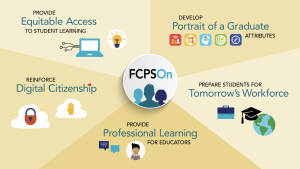 FCPSOn initiative goals. Source: FCPSOn Executive Summary" width="300" height="168" />
FCPSOn initiative goals. Source: FCPSOn Executive Summary" width="300" height="168" />Delivering a high-quality educational program requires measuring its effectiveness and making necessary adjustments along the way.
At the Johns Hopkins School of Education, we’re committed to improving educational programs and initiatives by expanding the body of evidence on what makes them effective.
From assessing what your stakeholders really think about your school community to identifying at-risk students early on, our expertise leads to informed decisions.
Our experts evaluate programs for all grade levels and content areas, as well as overarching topics in education, including school completion, post-secondary readiness (career and college), school reforms and partnerships, education technology, education policy, and community engagement.
An in-depth proprietary analysis that maps every piece of student-facing material across an ELA curriculum.
A tool that analyzes a social studies curriculum by mapping knowledge domains and the texts that are studied.
A survey that produces an “under the hood” analysis of behaviors and beliefs that influence student success.
A full picture of teachers’ use of curriculum materials and their satisfaction level with those materials.
An in-depth proprietary analysis that maps every piece of student-facing material across an ELA curriculum.
A tool that analyzes a social studies curriculum by mapping knowledge domains and the texts that are studied.
A survey that produces an “under the hood” analysis of behaviors and beliefs that influence student success.
A full picture of teachers’ use of curriculum materials and their satisfaction level with those materials.
The Johns Hopkins Institute for Education Policy strives to ensure that policy and practice are guided by research.
A technology solution that promotes early identification and referral for infants and toddlers who may be eligible for early intervention services.
A program that places early warning response systems in schools in under-resourced central Maryland neighborhoods.
Enabling all students, including those facing the toughest challenges, to build educational, social-emotional, and workplace skills that lead to success.
The Johns Hopkins Institute for Education Policy strives to ensure that policy and practice are guided by research.
A technology solution that promotes early identification and referral for infants and toddlers who may be eligible for early intervention services.
A program that places early warning response systems in schools in under-resourced central Maryland neighborhoods.
Enabling all students, including those facing the toughest challenges, to build educational, social-emotional, and workplace skills that lead to success.
One of the largest public school districts in the United States, Fairfax County Public Schools is rethinking what student success means in a technology-driven society.
FCPS partnered with the Center for Research and Reform in Education to evaluate a phased rollout of its FCPSOn program over several years. An innovative approach to technology-enhanced education and blended learning, FCPSOn involves the distribution of personal laptops for students, targeted professional development for teachers, unique tools for technology-enhanced classrooms, and moving beyond high-stakes assessment.
 FCPSOn initiative goals. Source: FCPSOn Executive Summary" width="300" height="168" />
FCPSOn initiative goals. Source: FCPSOn Executive Summary" width="300" height="168" />
Focus areas examined in the first three years included student technology use, teacher technology practices, and family technology perceptions. Among other key points, CRRE found high agreement among teachers — over 75% — that students had improved in their use of technology as a learning tool each year.